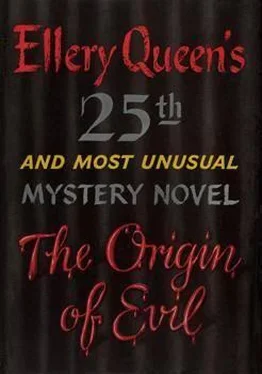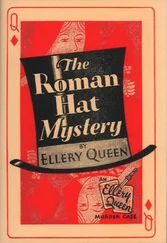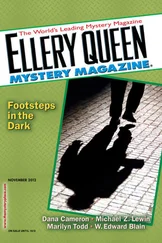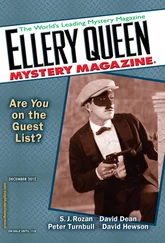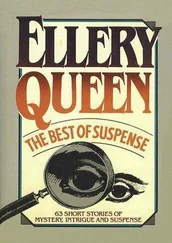Wallace raised his brows quizzically.
“In any event, he managed finally to land the job and to fool Roger Priam absolutely. Priam went to his death completely unaware that Wallace was actually Adam rather than the spurious substitute for Adam Priam thought he was palming off on the authorities. Priam never doubted for a moment that Adam’s bones were still lying in the coral sand of that deserted West Indian island.”
Ellery stared reflectively at Wallace, who was sipping his Scotch like a gentleman in his club. “I wonder what you really look like, Adam. The newspaper photos we dug up weren’t much use... Of course, twenty-five years have made a big difference. But you wouldn’t have trusted to that. Plastic work, almost certainly, and of the highest order; there isn’t a sign of it. Maybe a little something to your vocal cords. And lots of practice with such things as gait, tricks of speech, ‘characteristic’ gestures, and so on. It was probably all done years ago, so that you had plenty of time to obliterate all trace of ― forgive me ― of the old Adam. Priam never had a chance. Or Hill. And you had the virility Priam demanded in a secretary. You’d undoubtedly found out about that in your preliminary reconnaissance. A glimpse of Delia Priam, and you must have been absolutely delighted. Plum pudding to go with your roast beef.”
Wallace smiled appreciatively.
“I don’t know when ― or how ― Priam first let on that he wanted to be rid of Leander Hill. Maybe he never said so at all, in so many words. At least in the beginning. You were with him night and day, and you were studying him. You could hardly have remained blind to Priam’s hatred. I think, Wallace,” said Ellery, setting his feet on the coffee table, “yes, I think you got hold of Priam’s proboscis very early with your magnetic grip, and steered it this way and that. It would be a technique that appealed to you, feeling your victim’s desires and directing them, unsuspected, according to your own. Sensing that Priam wanted Hill dead, you led him around to becoming actively conscious of it. Then you let him chew on it. It took months, probably. But you had plenty of time, and you’d proved your patience.
“In the end, it became a passion with him.
“Of course, to do anything at all along that line he needed an accomplice. There couldn’t be any question as to who the accomplice might be. It wouldn’t surprise me if you dropped a few hints that you weren’t altogether unfamiliar with violence... you had vague ‘memories,’ perhaps, that came and went conveniently through the curtain of your ‘amnesia’... It was all very gradual, but one day you got there. It was out. And you were to do the ‘legwork.’ ”
Wallace surveyed the flames dreamily. Keats, watching him, listening to Ellery, had the most childish sense that all this was happening elsewhere, to other people.
“Priam had plans of his own. They would be Priam-like plans, crude and explosive ― a Molotov cocktail sort of thing. And you ‘admired’ them. But perhaps something a little less direct...? In discussing the possibilities you may have suggested that there might be something in the common background of Priam and Hill that would give Priam ― always Priam ― a psychologically sound springboard for a really clever plan. Eventually you got the story of Adam ― of yourself ― out of him. Because, of course, that’s what you were after all along.
“After that, it was ridiculously easy. All you had to do was put ideas into Priam’s head, so that they could come out of his mouth and, in doing so, convince him that they were original with him. In time you had the whole thing explicit. There was the plot that would give Priam the indestructible garment of innocence, Priam was convinced it was all his idea... and all the time it was the very plot you’d planned to use yourself. That must have been a great day, Wallace.”
Ellery turned to Keats.
“From that point it was a mere matter of operations. He’d mastered the technique of cuckolding Priam, psychologically as well as maritally; at every stage he made Priam think Priam was directing events and that he, Wallace, was carrying them out; but at every stage it was Priam who was ordering exactly what Wallace wanted him to order.
“It was Wallace who dictated the note to Hill, with Priam doing the typing ― just as you figured out, Keats. Wallace didn’t call it dictation ― he undoubtedly called it, humbly, ‘suggestions.’ And Priam typed away on a machine on which the T key was broken. Accident? There are no accidents where Wallace-Adam is concerned. He’d managed, somehow, and without Priam’s knowledge, to break that key; and he managed to persuade Priam that there was no danger in using the typewriter that way, since a vital part of the plan was to see to it that Hill destroyed the note after he read it. Of course, what Wallace wanted was a record of that note for us, and if Hill hadn’t secretly made a copy of it, you may be sure Wallace would have seen to it that a transcription was found ― by me or by you or by someone like Laurel who would take it to us at once. In the end, the clue of the missing T would trap Priam through the new T on Priam’s machine... just as Wallace planned.”
The man beyond Keats permitted himself a slight smile. He was looking down at his glass, modestly.
“And when he realized what was at the back of Priam’s mind,” continued Ellery, “the plan to kill him ... Wallace made use of that, too. He took advantage of events so that the biter would be bitten. When I told Wallace what I ‘knew,’ it coincided perfectly with his final move. The only trouble was ― eh, Adam? ― I knew a little too much.”
Wallace raised his glass. Almost it was a salute. But then he put it to his lips and it was hard to say if the gesture had meant anything at all.
Keats stirred, shifting in the comfortable chair as if it were uncomfortable. There was a wagon track between his eyes, leaving his forehead full of ruts.
“I’m not going good tonight, Queen,” he mumbled. “So far this all sounds to me like just theory. You say this man is Charles Adam. You put a lot of arguments together and it sounds great. Okay, so he’s Charles Adam. But how could you have been sure? It’s possible that he wasn’t Charles Adam. That he was John Jones, or Stanley Brown, or Cyril St. Clair, or Patrick Silverstein. I say it’s possible. Show me that it isn’t.”
Ellery laughed. “You’re not getting me involved in a defense of what’s been, not always admiringly, called the ‘Queen method.’ Fortunately, Keats, I can show you that it’s not possible for this man to be anyone else but Charles Adam. Where did he tell us he got the name Alfred Wallace?”
“He said he picked it out of thin air when he got an amnesia attack and couldn’t remember who he was.” Keats glowered. “All of which was horse-radish.”
“All of which was horse-radish,” nodded Ellery, “except the fact that, whatever his name was, it certainly wasn’t Alfred Wallace. He did pick that when he wanted an assumed name.”
“So what? There’s nothing unusual about the name Alfred Wallace.”
“Wrong, Keats. There’s something not only unusual and remarkable about the name Alfred Wallace, but unique.
“Alfred Wallace ― Alfred Russel Wallace ― was a contemporary of Charles Darwin’s. Alfred Wallace was the naturalist who arrived at a formulation of the evolution theory almost simultaneously with Darwin, although independently. In fact, their respective announcements were first given to the world in the form of a joint essay read before the Linnaean Society in 1858, and published in the Society’s Journal the same year. Darwin had drafted the outline of his ‘Theory’ in manuscript in 1842. Wallace, ill with fever in South America, came to the same conclusions and sent his findings to Darwin, which is how they came to be published simultaneously.”
Читать дальше
